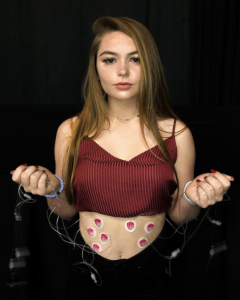The COVID-19 pandemic should serve as a wake up call.
Patient Testimonies | July 21, 2020
My name is Emmabella Rudd, and I’ve been an advocate for insulin accessibility and diabetes research since I was diagnosed with type 1 diabetes at 5 years old. I am an activist and patient advocate, but I’m so many other things as well. I am a student senator at Florida State University. I love art and painting and enjoy spending time outdoors.
I am fortunate that my family is able to afford my insulin right now, but that does not mean my medical care is affordable. My family and I pay around $4,000 each year for my insurance premiums alone, and an additional $3,000 for insulin and other supplies. This doesn’t even account for endocrinologist visits and hospital care, which occur often throughout the year.
 When I was growing up, I was not exposed to the never-ending uncertainty of insulin accessibility and financial instability. Now, I realize these concerns affect every part of my life and every financial decision my family makes. If I break a bottle of insulin, will I be able to go to the pharmacy and get more? How many hours will I have to spend on the phone with my insurance company instead of doing homework? I want to be a lawyer because I’m passionate about bioethics and human rights law, but will I be able to afford law school?
When I was growing up, I was not exposed to the never-ending uncertainty of insulin accessibility and financial instability. Now, I realize these concerns affect every part of my life and every financial decision my family makes. If I break a bottle of insulin, will I be able to go to the pharmacy and get more? How many hours will I have to spend on the phone with my insurance company instead of doing homework? I want to be a lawyer because I’m passionate about bioethics and human rights law, but will I be able to afford law school?
These issues go far beyond just me. I’ve had so many people with limited access to insulin reach out to me asking if I had any to spare. The COVID-19 pandemic has only made insulin accessibility more difficult for diabetes patients everywhere, and it should serve as a wake up call for lower insulin prices and health care injustices everywhere.
These experiences are why I’m helping to produce a documentary, Pay or Die, that looks at how the lives of people with type 1 diabetes are being threatened and lost due to the outrageous cost of insulin in America. The failures of the American health care system need to be addressed as a human rights issue.
It’s frustrating to see pharmaceutical companies bask in the protection of numerous patents around their insulin products. They’re interested in appearing concerned about drug affordability, but their efforts are always superficial and short-lived. Drug companies need to remember that their actions affect real human lives, and at the end of the day, the people will have the power.
I’ve grown up using my voice to elevate the concerns of the diabetes community, and I will not stop until all diabetes patients can do the things they love without having to worry about insulin accessibility.
